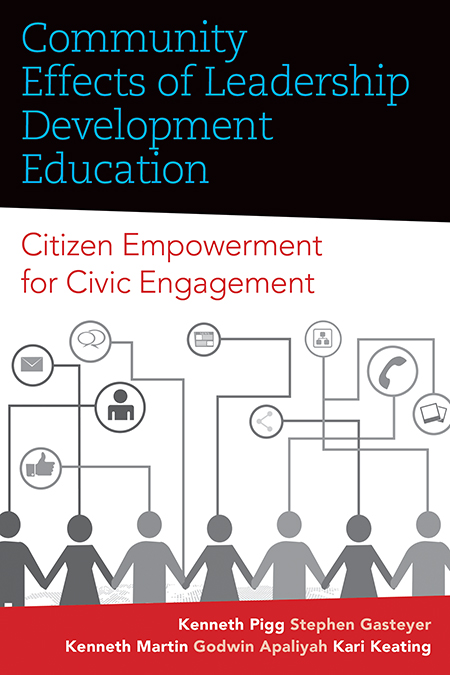
Kenneth Pigg,
Ken Martin,
Stephen P. Gasteyer, Godwin Apaliyah, and
Kari Keating
Rural Studies Series:
Volume 3
February 2015
256pp
PB 978-1-940425-58-0
$32.99
ePub 978-1-940425-59-7
$32.99
Summary
Community leadership development programs are designed to increase the capacity of citizens for civic engagement. These programs fill gaps in what people know about governance and the processes of governance, especially at the local level. The work of many in this field is a response to the recognition that in smaller, rural communities, disadvantaged neighborhoods, or disaster areas, the skills and aptitudes needed for citizens to be successful leaders are often missing or underdeveloped.
Community Effects of Leadership Development Education presents the results of a five-year study tracking community-level effects of community leadership development programs drawn from research conducted in Illinois, Minnesota, Missouri, South Carolina, Ohio, and West Virginia.
As the first book of its kind to seek answers to the question of whether or not the millions of dollars invested each year in community leadership development programs are valuable in the real world, this book challenges researchers, community organizers, and citizens to identify improved ways of demonstrating the link from program to implementation, as well as the way in which programs are conceived and designed.
This text also explores how leadership development programs relate to civic engagement, power and empowerment, and community change, and it demonstrates that community leadership development programs really do produce community change. At the same time, the findings of this study strongly support a relational view of community leadership, as opposed to other traditional leadership models used for program design.
To complement their findings, the authors have developed CENCE, a new model for community leadership development programs, which links leadership development efforts to community development by understanding how Civic Engagement, Networks, Commitment, and Empowerment work together to produce community viability.
Contents
Coming Soon.
Author
Kenneth Pigg has been helping community leaders become more effective change agents in their community for over forty years as a specialist with the Cooperative Extension Service in Kentucky and Missouri and has served on a number of national panels and projects dealing with community change and leadership.
Ken Martin is Chair of the Department of Extension and Associate Director, Programs for Ohio State University Extension.
Stephen P. Gasteyer is an Associate Professor of Sociology at Michigan State University.
Godwin T. Apaliyah is the The Ohio State University Extension’s Community Development Educator, and the Director of Economic Development, Fayette County.
Kari Keating is a Teaching Associate in Agricultural Leadership Education at the University of Illinois.
Reviews
Coming Soon.













